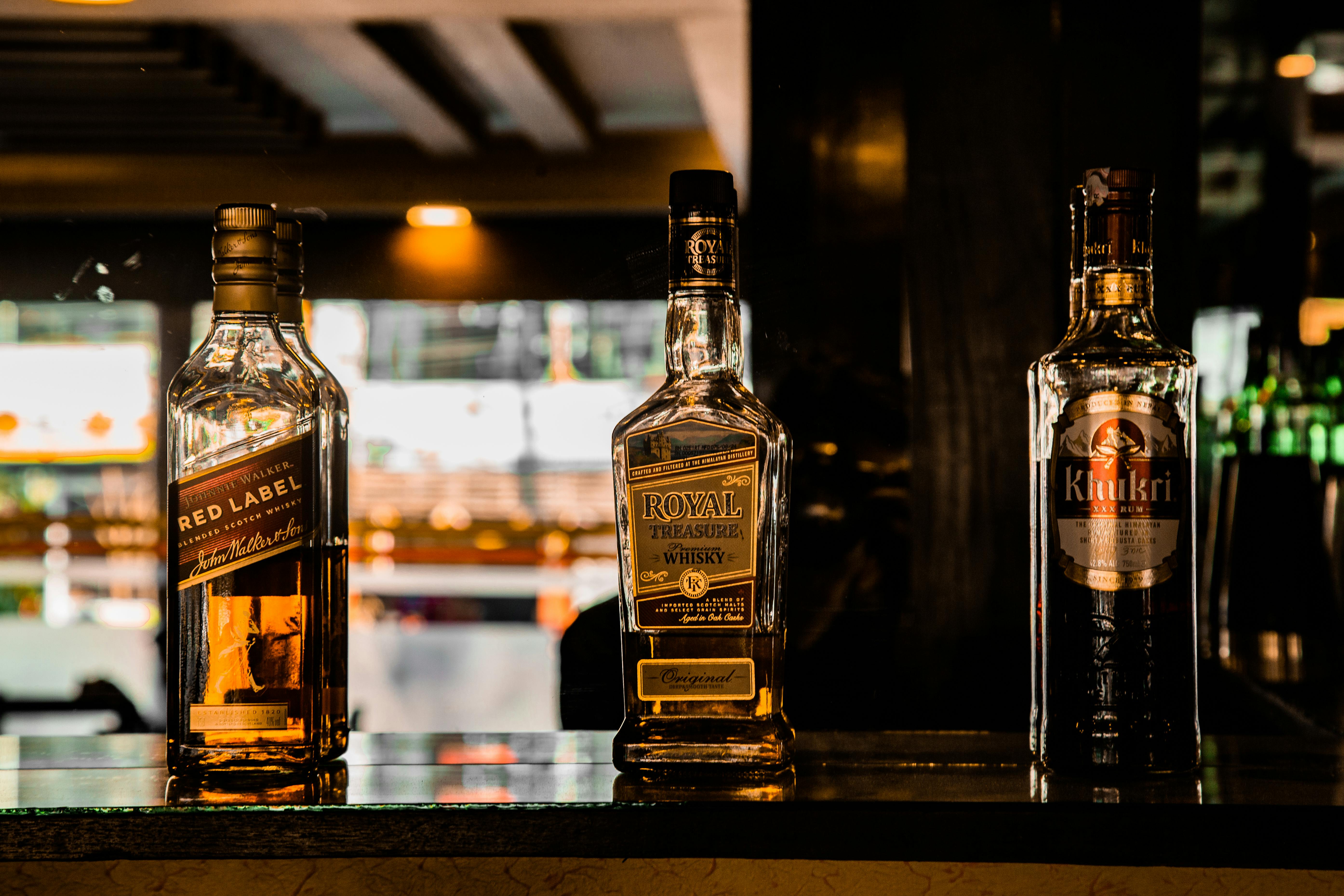Mashing and Fermenting
The first step in distilling your own whiskey is mashing and fermenting. Mashing involves breaking down barley or other grains into sugar, which will be fermented into alcohol. To mash the grains, you must steep them in hot water for several hours. After mashing, the liquid is called wort and it will be combined with yeast to convert the sugars into alcohol. The resulting liquid is then transferred to a fermenter where it will be left for several days until fermentation is complete.Distillation
Once fermentation is complete, the liquid can then be distilled to increase its alcoholic content. Distillation involves heating the fermented liquid in a still, which separates the alcohol from the water in the mixture. The alcohol vaporizes and is collected in a condenser before being collected as whiskey. Depending on your desired result, you may choose to distill multiple times to further increase its alcoholic content.Aging
The final step in creating your own whiskey is aging. Aging allows complex flavors to develop and mellow out harsh notes that are associated with young whiskey. To age whiskey, you must transfer it to an oak barrel where it can sit for several months or years depending on your desired taste. During this time, oxygen interacts with the whiskey producing a smoother flavor profile.Creating your own whiskey requires patience but can be an incredibly rewarding experience. With these steps in mind, you can start distilling your own whiskey at home!
Necessary Equipment for Distilling Whiskey at Home
Distilling whiskey at home is becoming increasingly popular. With the right equipment, anyone can make their own whiskey. Before you start distilling whiskey at home, you’ll need to acquire the necessary equipment and supplies. Here is a list of what you’ll need to get started:Mash Tun: The mash tun is a container that holds the grain and hot water mixture that will become your whiskey. It should be made of stainless steel or food grade plastic, as other materials may leach harmful compounds into your whiskey.
Still: The still is the apparatus that separates the alcohol from the rest of the liquid in your mash. There are several different types of stills available on the market, but for home distilling a pot still is usually recommended. It should be made of stainless steel or copper for best results.
Thermometer: A thermometer is essential for measuring temperature during the distillation process. A digital thermometer with an adjustable alarm is a good choice for home distillers.
Hydrometer: A hydrometer measures alcohol content in your whiskey by measuring its density compared to water. This will help you determine when it’s time to stop distilling and bottle your whiskey.
Funnel: A funnel will come in handy when transferring liquid from one container to another during the distillation process. It should be made of stainless steel or food grade plastic so it won’t leach any compounds into your whiskey while it’s being transferred.
Bottles: You’ll need bottles to store your finished product in. Make sure they are made of glass with airtight lids so they won’t leak any impurities into your whiskey over time.
With all these items, you’ll be well equipped to start distilling your own whiskey at home!
Ingredients for Making Whiskey
Whiskey is an alcoholic beverage made from fermented grain mash. To make whiskey, you need several key ingredients: grains, yeast, water, and time. Grains like barley, rye, wheat, and corn are commonly used in the production of whiskey. The grain is then mashed to break down the starches into sugar to be fermented by the yeast. The yeast then converts the sugar into alcohol. After fermentation is complete, the liquid is distilled to create whiskey. Water is also an important ingredient used in whiskey production as it helps dilute and balance out the flavor of the whiskey. Finally, time is necessary for aging in barrels to allow for flavor development and maturation of the whiskey. By combining these ingredients with different processes and techniques, distillers can create a variety of unique whiskeys.In short, to make whiskey you need grains such as barley or rye, yeast for fermentation, water for dilution and balancing out flavors, and time for aging. With these ingredients combined with different techniques and processes, distillers can produce a wide range of whiskeys with unique flavors and characteristics.
Types of Whiskey You Can Make at Home
Whiskey is one of the most popular spirits in the world and can be made from a variety of grains. Making whiskey at home is a fun and rewarding experience, and there are several types of whiskey that you can make. The most common type of whiskey is made from malted barley, but other grains such as wheat, rye, oats, and corn can also be used. Each grain will give the whiskey a unique flavor, so experimenting with different grain combinations can yield interesting results.Single malt whiskey is made from 100% malted barley and has a distinct flavor that is usually quite smooth. This type of whiskey is usually quite expensive to buy commercially, but you can make your own single malt at home for a fraction of the cost. Blended whiskeys are made by combining two or more types of whiskey together to create an entirely new flavor profile. This type of whiskey tends to be more affordable than single malt whiskeys and can be great for mixing cocktails.
Grain whiskeys are also fairly common and are usually made from wheat or corn. These whiskeys tend to have a sweeter flavor than other types of whisky due to the higher sugar content in the grains used. Rye whiskey is also popular but tends to have a spicier flavor thanks to the higher concentration of rye in its mash bill. Finally, fruit-flavored whiskeys are becoming increasingly popular as more people look for creative ways to enjoy their favorite spirit. These whiskeys are usually made by infusing fruit flavors into the spirit during distillation or aging process.

Safety Measures for Distilling Whiskey
Distilling whiskey is an enjoyable and rewarding experience, but it must be done with caution. It is important to take the proper safety measures when distilling whiskey to ensure a safe and successful outcome. Here are some safety tips to keep in mind when distilling whiskey:First and foremost, always use the correct equipment when distilling whiskey. This includes a still, thermometer, hydrometer, glass containers and other essential items. These should all be used in accordance with the manufacturer’s instructions in order to ensure safe operation. Never attempt to make any modifications or adjustments to the equipment.
Next, it is important to wear the appropriate clothing and protective gear when distilling whiskey. Wear long sleeves and pants to protect your skin from any potential splashes or spills that may occur during the process. Additionally, use safety glasses and gloves whenever handling hot liquids or equipment.
It is also important to have a fire extinguisher nearby at all times when distilling whiskey. In addition, never attempt to distill alcohol without proper ventilation; this can lead to dangerous concentrations of fumes that can cause serious health problems if inhaled by humans or pets.
Finally, never leave your still unattended while it is running. Always monitor the progress of your whiskey as you are making it in order to ensure that everything goes smoothly and there are no issues with contamination or other problems that could harm your final product.
By following these simple safety tips, you can make sure that your experience with distilling whiskey will be both enjoyable and successful!
Pros of Distilling Your Own Whiskey
Distilling your own whiskey can be a fun and rewarding experience. With the right equipment and knowledge, you can make a quality whiskey that is unique to you. Making your own whiskey gives you the freedom to experiment with different flavors, ingredients, and aging techniques. You can also save money by not having to buy expensive bottles of store-bought whiskey. Additionally, distilling your own whiskey allows you to control the quality of the product, ensuring that it meets your standards.Cons of Distilling Your Own Whiskey
Distilling your own whiskey can be a time-consuming process that requires patience and dedication. It also requires a significant investment in equipment, such as a still, which can be costly. Additionally, there is a risk of producing an inferior product if you don’t have adequate knowledge or experience in distillation. Finally, it’s important to note that some countries and states require distillers to acquire a license before they are allowed to produce whiskey for sale or consumption.Is Understanding Distilling Alcohol Necessary for Distilling My Own Whiskey?
Is Understanding Distilling Alcohol Necessary for Distilling My Own Whiskey? Absolutely. Mastering the understanding alcohol distillation process is crucial for crafting quality whiskey. It allows you to control flavors, alcohol content, and ensure safety during production. A solid grasp of this process transforms ingredients into a smooth, enjoyable spirit, elevating your distilling experience.
Is Distilling Wine at Home Similar to Distilling My Own Whiskey?
Distilling wine in your kitchen shares similarities with whiskey production, but key differences set them apart. Both processes involve fermentation and distillation; however, wine distillation typically focuses on preserving delicate flavors while whiskey emphasizes rich, robust profiles. Understanding these nuances can enhance your home distillation experience, regardless of the beverage.
The Cost of Making Your Own Whiskey at Home
Making whiskey at home can be a fun and rewarding experience. Many people enjoy the process of aging and distilling their own whiskey, but the cost involved can be prohibitive. The cost of making your own whiskey at home depends on the quality of ingredients you use and the type of equipment you need to make it.The first expense is the raw materials needed to make whiskey. Grain is usually the most expensive ingredient, but you’ll also need other items such as yeast and flavoring agents. The amount of grain you need will depend on how much whiskey you want to make, so it’s important to plan ahead.You’ll also need to buy some basic equipment for making whiskey. This includes things like a fermentation tank, distillation apparatus, and aging barrels. Depending on how elaborate your setup is, these items can range from a few hundred dollars to several thousand dollars.Lastly, there are other miscellaneous expenses associated with making whiskey at home such as bottles, labels, corks and shrink-wrapping materials. These costs can add up quickly if you’re not careful.Overall, the cost of making your own whiskey at home can vary greatly depending on the quality of ingredients and equipment used. If you’re just starting out, it’s best to keep your costs low by using basic ingredients and simple equipment until you get more experienced with the process.However, if you have some money to invest in your hobby then higher-end ingredients and more sophisticated equipment can help produce better results in less time. Ultimately, it comes down to what type of experience you’re looking for when it comes to making whiskey at home – whether that means saving money or investing in a high-end setup with top-notch results.

Conclusion
Distilling whiskey is a complex process that requires precise measurements and a lot of patience. While it may be possible for a home distiller to produce their own whiskey, it is important to remember the safety risks associated with distilling alcohol. It is also important to understand and adhere to local laws regarding the distillation of alcohol. Distilling whiskey can be a rewarding experience, but it should not be taken lightly. There are many tips and tricks that can help make the process easier, but only through practice and experience will one truly become an expert.Ultimately, if you want to distill your own whiskey at home, you should do your research and make sure you comply with all applicable laws. With the right equipment and knowledge, you can make your own delicious whiskey that will impress your friends!

